On Saturday fifth of June 2021 Lichfield and District Soroptimists ran their first online planet conference entitled Global Challenges, Local Action…Here’s a summary of what went on…
We were joined at Global Challenges, Local Action by Soroptimists from across the UK and also from our club’s German friendship link Club – SI Kaarst. In addition local partners from other organizations with whom we have worked or will be working also attended.
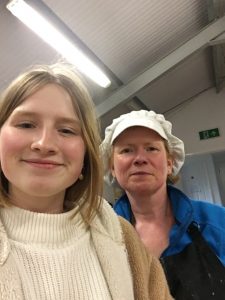 We were joined by six exceptional speakers. Starting first of all with a strongly local flavour from Woodhouse Farm and Garden CIC. Annamarie Stone and her daughter Rhiannon joined us to talk about their “Family business, Community, Oh and Lockdown”. They gave us an excellent insight into the history of their farm business from inception to today.
We were joined by six exceptional speakers. Starting first of all with a strongly local flavour from Woodhouse Farm and Garden CIC. Annamarie Stone and her daughter Rhiannon joined us to talk about their “Family business, Community, Oh and Lockdown”. They gave us an excellent insight into the history of their farm business from inception to today.
They started off by making changes to the walled garden, which has links to Capability Brown. The major learning point for them when they first started was the impact of gardening in a walled garden environment. This activity enabled them to start their community-supported agriculture (CSA) project, which consists of regular in-season veg and fruit boxes obtainable by subscription.
As time moved on they added Irish Moiled cattle, which is an at-risk breed in this country, and also pigs, chickens, and geese. All their pigs are butchered and processed locally by Annamarie herself who does all the butchery on site where she makes all their sausages, bacon and pork pies and also joints her own meat for local supply at a local market at the Bell Pub in Whittington itself and also sold from the farm on Fridays and Saturdays.
They have become very aware of the importance of the weather and climate change and its significant ability to impact on which crops they can grow successfully each year. One year they needed to add full irrigation in order to protect the crops from drought, and then the second year there was more rain than they ever known! So they have to think very carefully about the kind of crops they select, how they plan them and how they mitigate the effects of climate change on their business.
The farm became a CIC in 2004 and gets involved now in a wide range of activities in addition to their farming and growing activity. For example, they press cider apples in community groups, host art groups, and are involved in care farming which helps people with mental health issues.
People can volunteer on the farm and they’ve also developed a wide range of branded produce including preserves, cakes and other items. Annamarie does this in order to keep waste to a minimum – if she can’t use all the produce or sell it immediately, she freezes it and then cooks it into the Woodhouse Farm range.
The Stone family don’t use any chemicals in their business. Their cows don’t come in from the fields unless it’s absolutely essential because of the weather; the pigs live in the garden where they eat the weeds and clear the ground and manure it;; and they are as organic as they can possibly be. Unfortunately, they can’t apply for organic status as they are located too close to another farm which is not organic in any way.
Our second speaker was Colin Hastings from the Carbon Buddy Project.
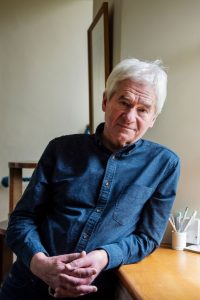 Colin was at pains to tell us that he’s actually an organizational psychologist and not a climate expert, and he feels this has really given him an edge in terms of his campaigning work in terms of climate change and what he calls the “serious action gap” which exists.
Colin was at pains to tell us that he’s actually an organizational psychologist and not a climate expert, and he feels this has really given him an edge in terms of his campaigning work in terms of climate change and what he calls the “serious action gap” which exists.
Apparently only 20% of us are really taking any action at all in terms of reducing our carbon footprint. Unfortunately, there is massive urgency now and there are two things that we need to do. We need to speed up and we need to scale up. So the 80% of us who aren’t doing anything at all in terms of climate change or aren’t getting engaged at all, need to change and we need to find ways of helping them do more.
So we need to understand what stops us taking action and the biggest reason Colin finds is people say “I’m completely overwhelmed”. Our planet work at SI Lichfield and District has taught us the Climate Challenge is an extraordinarily complicated issue and there are many, many aspects to it. The design of our own conference with six different speakers was intended to give a flavour for that as each speaker represented a different aspect of action that can be taken in the climate change emergency which faces us. And even then we only scratched the surface.
Colin reviewed our Club’s Planet actions and was complimentary in some ways about the work that we do such as our gardening, litter picking and other things that we do to give service in this area.
However, he was, let’s say, a “critical friend” and said that what we really need to focus on is our personal emissions and our pollution as individuals, rather than the activities that we were doing. There was nothing wrong with what we were doing – it’s excellent community work of course; but if we really want to make a difference as a club and as a broader organisation then we must individually reduce our personal pollution levels. The easiest place to start, says Colin, is to get a 100% green energy tariff, fly less, use public transport more, use rechargeable battery technology wherever possible e.g garden tools and invest in non-fossil fuel heating.
Colin feels we’re in an excellent position as women in the majority world to engage with Generation Z and Millennials in extended family groups. He also feels that as an organization Soroptimist International should be able to act as a key influencer in what’s happening in our country in terms of engaging people to reduce their personal carbon footprint.
He advised us to look closely at what we do now and ask ourselves “How does what we’re doing contribute to reducing carbon emissions NOW?” Are we doing the right things? In the right way?. Do we need to do things differently? Lichfield and District club will be using Colin’s Carbon Buddy Manual as a road map for how we can reduce our own individual carbon footprint within the club, but also to give us some ideas how we can help others do the same. We’ll be working in groups going forward to do that.
Colin’s presentation was very thought-provoking, and very feasible, and epitomises his practical hands-on approach to helping to confront the climate challenge.
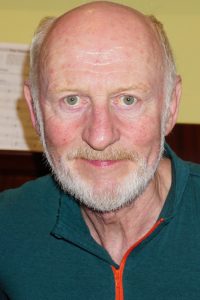 Our third speaker was Ian Retson of The Woodland Trust. Ian’s a volunteer with the Woodland Trust and has been working with them for many years now. He opened his presentation by referring to how he became interested in the climate challenge citing Rachel Carson’s 1962 book Silent Spring, and Joni Mitchell’s song Big Yellow Taxi. So it was a very personal account, and while he very much acknowledges that there is a climate emergency confronting us, he did also feel that there was hope out there on the horizon.
Our third speaker was Ian Retson of The Woodland Trust. Ian’s a volunteer with the Woodland Trust and has been working with them for many years now. He opened his presentation by referring to how he became interested in the climate challenge citing Rachel Carson’s 1962 book Silent Spring, and Joni Mitchell’s song Big Yellow Taxi. So it was a very personal account, and while he very much acknowledges that there is a climate emergency confronting us, he did also feel that there was hope out there on the horizon.
Ian talked about the activity of the Woodland Trust and how over the last 30 years, despite significant efforts to increase the woodland cover of the United Kingdom, the actual percentage increase has not been as large as we would have wanted or hoped.
The Woodland Trust produced a very comprehensive report in 2121 called The State of the UK’s Woods and Trees and the findings were VERY clear: we need many, many more native broadleaf trees in the United Kingdom. What we don’t need are any more conifers. We need joined-up thinking to create joined-up habitats, and we must make sure that everything we do helps with increasing the numbers of home-grown (not imported) native trees.
Ian was keen to point out that all 1,200 woodlands managed by the Woodland Trust in the UK are free to all, and one of the group’s local favourites is Pipe Hall Farm Wood near Lichfield.
Ian was extensively quizzed by delegates on the most appropriate small trees for gardens, if we don’t have a lot of room.
His recommendations included the smaller cherry trees with a caveat that some of them grow very big indeed so it’s very important to be careful what format you buy; and also the guelder rose (also known as viburnum), which is very colourful and doesn’t grow too big and is a fabulous tree or bush shrub for your small garden.
We discussed the SIGBI centennial project and Ian was very complimentary about that, and wished us all the luck in the world. We closed by thinking about how we might introduce trees into one of our newest projects, which is the Spark children’s centre in Burntwood. We’re particularly keen on the idea of small fruit trees, so the children can learn to grow and harvest and eat their own produce.
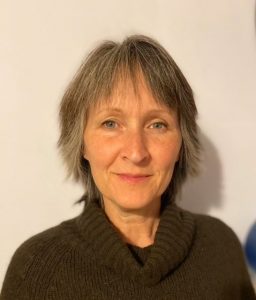 Dr. Hayley Pinto of Greenpeace – our fourth speaker – is an NHS lead consultant psychiatrist and a long-standing environmental activist. She talked to us very eloquently about the impact on human health of climate change.
Dr. Hayley Pinto of Greenpeace – our fourth speaker – is an NHS lead consultant psychiatrist and a long-standing environmental activist. She talked to us very eloquently about the impact on human health of climate change.
Her presentation was wholly science-based and her slides were frankly quite frightening in many ways. It’s clear that this is not a situation that we can allow to drift any longer. Hayley went to great lengths to contextualize how climate change across the globe is having a massive impact on human health, especially on that of women and children.
2020 was the hottest year on record and Hayley explored the reasons for “run away heating” of the planet in detail for us. A rise in temperature of 3-4 degrees – which is highly likely – will result in the devastation of the majority of our eco systems and as humans, we are unlikely to be able to adapt to this scenario.
The Lancet’s commission on Health & Climate has concluded that:
“Current emissions trajectories pose an unacceptable and potentially catastrophic risk to human health, threatening to undermine the last half-century of advances in public health.”
Pandemics, disease, air pollution, drought and extreme weather will all combine to drastically undermine human health and impact disproportionately on women and children.
She touched briefly on eco distress which chimed clearly with Colin Hastings’ idea of “I’m overwhelmed”. Hayley made the point that that feeling of being overwhelmed and complete sadness and distress at the state of the environment is an absolutely normal response in human beings, it’s not a mental health issue.
But Hayley’s professional view, as an expert in the field, is that doing something is the way to overcome the eco-distress that we all feel when we look at the damage to the world around us. Again, this links very strongly to Colin’s approach of creating a simple plan to reduce your carbon emissions and then getting on with it.
Hayley’s view is that the single biggest thing that we can do to help the climate is to look after our own health. This means making good lifestyle choices: cutting our carbon footprint, keeping fit, eating good quality plant-based food and eating less meat, and making sure that you stay physically fit for as long as possible.
 Nicola Lynes from Transforming The Trent Valley (TTTV) is well known to a number of Soroptimist clubs in our region. This time she took a different approach and explained how the Trent Valley is being developed to enable nature connection for all. She described all the activities that have been done and are planned to be done, and particularly focused on how they had adapted as an organisation during the Covid 19 pandemic to enable their projects to continue in a very practical and progressive way, while still engaging the local community.
Nicola Lynes from Transforming The Trent Valley (TTTV) is well known to a number of Soroptimist clubs in our region. This time she took a different approach and explained how the Trent Valley is being developed to enable nature connection for all. She described all the activities that have been done and are planned to be done, and particularly focused on how they had adapted as an organisation during the Covid 19 pandemic to enable their projects to continue in a very practical and progressive way, while still engaging the local community.
Unable to deliver their activities face to face, they expanded their online presence extensively to enable community engagement and delivery, and instituted a number of what they called Trent Talks on various aspects of the environment from butterfly conservation to waste management and a wide range of other subjects.
Nicola also described how the local community can get involved in the TTTV project as wildlife recorders; creative content volunteers; history rangers and photography volunteers. She encouraged us all locally to get involved in the project. There are funds available for organizations who fall within the TTTV map area and she urged us all to consider what we could do to help the project move forward as proactive local groups.
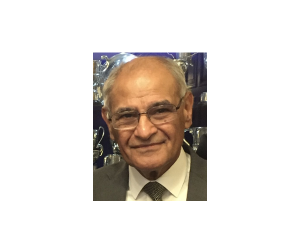 Finally Professor Rashid Gatrad and Jennifer Carless from World Against Single Use Plastics regaled us with a history of the organization and how it was set up locally in Walsall, but has now grown to encompass not only the UK, but also overseas subgroups of WASUP too.
Finally Professor Rashid Gatrad and Jennifer Carless from World Against Single Use Plastics regaled us with a history of the organization and how it was set up locally in Walsall, but has now grown to encompass not only the UK, but also overseas subgroups of WASUP too.
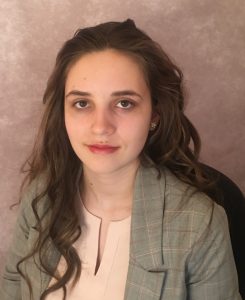 Rashid explained how his work to reduce single use plastics within the NHS – where he is a paediatric consultant – blossomed into a broader theme of reducing the plastic tide across the world. Like Dr Hayley Pinto he also made clear links between climate change and human health.
Rashid explained how his work to reduce single use plastics within the NHS – where he is a paediatric consultant – blossomed into a broader theme of reducing the plastic tide across the world. Like Dr Hayley Pinto he also made clear links between climate change and human health.
A key theme was our ability to protect our environment by using our natural human imagination and creativity, and he showcased a number of fascinating projects doing just that. Jennifer closed the conference by talking about the overseas activities of WASUP and encouraged us to think about how we might incorporate some of their activities into our own Planet activity; and how we might promote each other and work collaboratively across our regional area..
The conference was very well received by the delegates. We were fortunate to receive some fabulous compliments, including one from Carina who said ”[Global challenges, local action] An inspiring, thought-provoking conference that has been a real call to action.”
We’ll now move forward in club with our own carbon buddy projects, and we’ll be updating you on our progress as we move forward.

